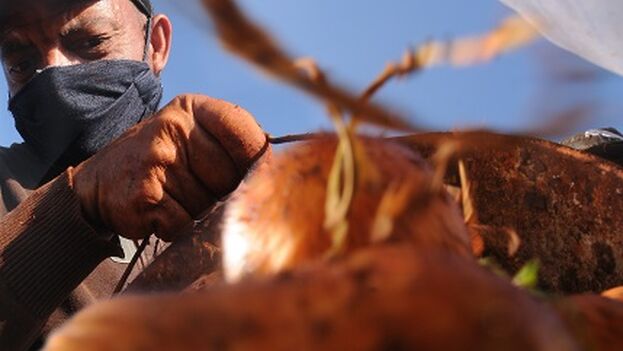
Natalia Lopez Moya, Havana | 28 November 2022 — Earlier this month, the Cuba-Mexico Friendship Agricultural Production Cooperative began planting potatoes in the municipality of Alquízar, Artemisa. However, the cold season got off to a bad start, and the power cuts forced changes in the irrigation cycles that have ended up damaging most of the crop.
“This crop occupies 12 caballerías* [161 hectares/398 acres] of land divided into four quadrants. Three of these quadrants were damaged, only one survived,” Mauricio Díaz, a resident near the planted fields, explained to 14ymedio. “It was because of the blackouts,” he added.
“For everything to have gone well, it would have been necessary to maintain irrigation for several hours and with a certain intensity,” Díaz details. “But since they are cutting off power almost every day, it was decided to reduce the time to avoid the blackouts and add more water in fewer hours. The result was that the land was flooded and the potatoes rotted.”
Only about 40 hectares of the crop managed to be saved from the excess humidity. “We have had to start dismantling the rest and the townspeople are coming to try to get the rotten potatoes, even if it is to feed them to the pigs,” says the farmer.
“There are some people who have gotten lucky and have managed to find a few potatoes in good condition among the others that were spoiled, but that is hard work because the stench around here doesn’t even let you breathe”
There are some people who have gotten lucky and have managed to find a few potatoes in good condition among the others that were spoiled, but that is hard work because the stench around here doesn’t even let you breathe and there are flies everywhere,” he remarks. “The worst thing is that this planting was already small compared to other years and now with this situation, Alquízar will hardly be able to harvest the product.”
Beginning November 1, the cooperative began the operation with the planting of 68 hectares of potatoes and the initial proposal was to plant 170 using national seed on 83 of the hectares, and to obtain the rest of the seeds from overseas, according to what the director of the agricultural entity, Pedro Miguel García Velíz, told the local press.
“Currently, we are working on preparing the land for the sowing of the imported seed, which should end in the first days of December,” clarified García Velíz, who acknowledged that the province of Artemisa had only planned to plant 450 hectares in this cold season operation, 150 less than in the previous year.
The main territories for potato cultivation in the province are Alquízar, Güira de Melena, Artemisa and San Antonio de los Baños. Harvesting is scheduled for the first days of February, but the chances of recovering the damaged hectares are remote. “This is going to be the worst year for potatoes that I can remember in a long time,” warns a worker at the Cuba-Mexico Friendship Cooperative.
“We had to choose between two evils: either add more water in less time or have our crops dry up due to lack of water”
“We are going to have big losses because most of the seeds we are using are imported and paid for in foreign currency,” he told this newspaper. “But what could be done if the blackouts did not allow for things to be done as they should be. We had to choose between two evils: either add more water in less time or have our crops dry up due to lack of water.”
The bad news seems to haunt a production that has fallen to historic lows. The 2021-2022 operation barely achieved a harvest of 93,650 tons, the worst in the last 30 years, with the exception of 2014, according to a report released by the Ministry of Agriculture. The negative numbers have forced the sale of the potatoes in a rationed way in recent years.
Last February, the retail price of the product almost doubled when it went from 3 pesos a pound to 5 pesos, and a new price for refrigerated potatoes was created, which is now 6 pesos. The official argument for this increase was the rise in the cost of agricultural raw materials and the increase in the labor cost per employee.
In the black market, a three-pound bag of potatoes currently costs 250 pesos, but even at that price, the product often disappears from informal trade networks. With the catastrophe that occurred in Alquízar, it is very likely that its price will continue to rise and its presence will become more and more sporadic in the coming months.
*Translator’s note: The caballería is a unit of land measurement in the Spanish viceroyalties in the Americas during the times of the Spanish Empire in the 16th through 19th centuries in the Spanish West Indies. One caballería = 111.19742 acres.
Translated by Norma Whiting
